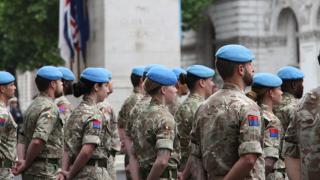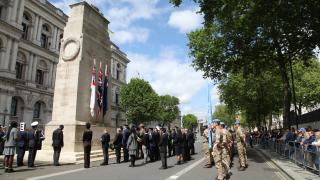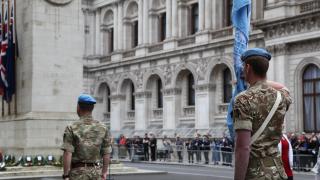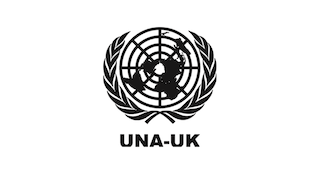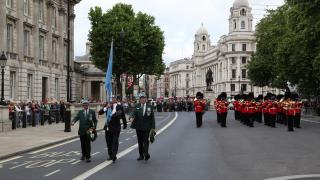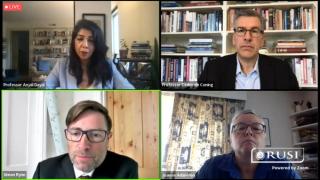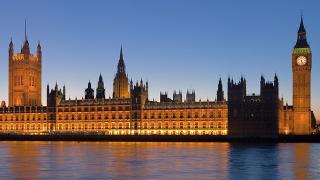
The UK will hold a General Election on 12 December 2019. Clearly, debates around the UK’s decision to leave the European Union, a matter on which UNA-UK remains neutral, will play a significant part in the national conversation. However, this poll, which will decide what policies the United Kingdom pursues for the foreseeable future, is far too important to be limited to any one issue.
It is vital that parties and candidates address the range of – increasingly global – issues that impact our day-to-day lives: from our international network of trade and diplomacy, to climate change: surely the defining issue of our time.
UNA-UK has longstanding policy positions on many issues which merit significant attention in the national debate, including on climate change, gender equality, prevention of atrocities, sexual exploitation and sexual violence by UN peacekeepers and sustainable development. We also hope for informed debate on the need to proactively ban lethal autonomous weapons systems and put human rights before profit when it comes to arms exports – an urgent requirement exposed by the actions of the Saudi-led coalition in Yemen.
We urge politicians of all parties to make use of our resources and carefully consider these vital issues, and we urge our members and supporters to quiz their candidates on their approaches to them. We will be releasing a canvassing toolkit in the days to come to make sure that happens.
We also feel that 2020 is a make or break year for our international system. It will see the 75th anniversary of the United Nations, crucial summits on nuclear disarmament and climate change, and further debates between populists and their critics over the very value of multilateralism. 75 years ago the UK, then a very different kind of power, made a strong case for the creation of the United Nations. Similar bold leadership to reform our global system, and truly make it deliver for all, is called for once again. To this end we will be writing to the leaders of all parliamentary political parties and asking them to outline their strategy for the United Nations.
UNA-UK would also like to see parties commit to three realistic and achievable concrete actions on peacekeeping, nuclear disarmament and on human rights which, in addition to their inherent value, would radically improve global perceptions of the UK and amplify the UK’s influence in international forums. They are:
1. An enhanced commitment to UN peacekeeping
UN peacekeeping is one of the international community’s most important tools to help end conflicts and foster reconciliation. Over the past 70 years, UN missions have succeeded in dozens of countries, from Liberia to Tajikistan. Studies have found it to be more effective and substantially cheaper than comparable operations. They also significantly benefit the troops involved, providing unmatched training, coalition building, and career enrichment opportunities.
The UK has a commendable record on UN peacekeeping and has increased its troop contributions of late: doubling the number of troops deployed in 2016 and recently committing to a higher-risk and very valuable deployment in Mali. However, given the size and capacity of the UK’s armed forces, the lack of other significant deployments, and the obligations placed upon the UK by its permanent membership of the UN Security Council, there is a capacity to make yet greater contributions.
The contribution of an additional battalion-size contingent would make the UK the biggest Troop Contributing Country in Europe. This would significantly increase the UK’s prestige and clout in the UN, answering many of the questions raised regarding the legitimacy of UK’s leadership role at the Security Council. It would also go a significant way to bridging the divide at the heart of peacekeeping between “those that lead and those that bleed”.
UN peacekeeping is incredibly cost effective, and many of the costs are covered by the UN itself. However, it is not a revenue neutral endeavour for a state such as the UK, and so such a commitment would need to be supported by the earmarking of funds and identification of suitable funding streams. The exact amount such a deployment would cost would vary significantly according to its location and nature, but the sums involved are relatively speaking not large – of the same order of magnitude as the cost of purchasing a single fighter aircraft.
2. A friend to the Treaty on the Prohibition of Nuclear Weapons
World leaders will meet next year to discuss the system for regulating nuclear weapons – the Non-Proliferation Treaty. The lack of progress on disarmament from nuclear armed states means that trust is at an all time low, and there is a very real chance that this process will disintegrate. States and experts are increasingly questioning whether multilateral disarmament might have had its day.
In this context there is an urgent need for the UK to rebuild trust with non-nuclear states by taking a completely fresh attitude to the Treaty on the Prohibition of Nuclear Weapons (TPNW) – also known as the nuclear ban treaty, which is supported by a majority of states and is an understandable response to nuclear armed states’ failure to live up to their legal obligation to work for a world free of nuclear weapons.
The UK should acknowledge the TPNW’s value and legitimacy in building a world free from nuclear weapons. It should signal an intention to attend future meetings of states parties to the Treaty as an observer. And it should follow the guidance of UN officials such as the UN High Representative on Disarmament Affairs: “don’t ignore it, don’t attack it”. To be taken seriously these actions must be pursued in tandem with unmistakable UK actions to make progress on its international obligation to disarm. This would place the UK in the vital position of bridgebuilder between nuclear and non-nuclear states.
3. A world leader on human rights funding
Human rights are under siege at a time when they are more needed than ever. And yet the funding that human rights receives is pitiful, particularly with respect to overall aid funding – a dynamic that contributes to human rights becoming the “forgotten pillar” of our global system.
The UK should commit to earmarking 1% of its Official Development Assistance budget, 0.007% of GNI, to human rights. This amount is readily affordable, and indeed might seem inconsequential, but would represent a tripling of current budgets. In addition to the important work that these funds would do in protecting the most vulnerable, making this commitment would send a powerful signal as to the importance of the agenda.
Much as the UK’s commitment to spending 0.7% of GNI to Official Development Assistance makes the UK a world leader on development issues and forms a significant part of British soft power, this commitment would propel the UK into a leadership position in defence of the human rights agenda.

